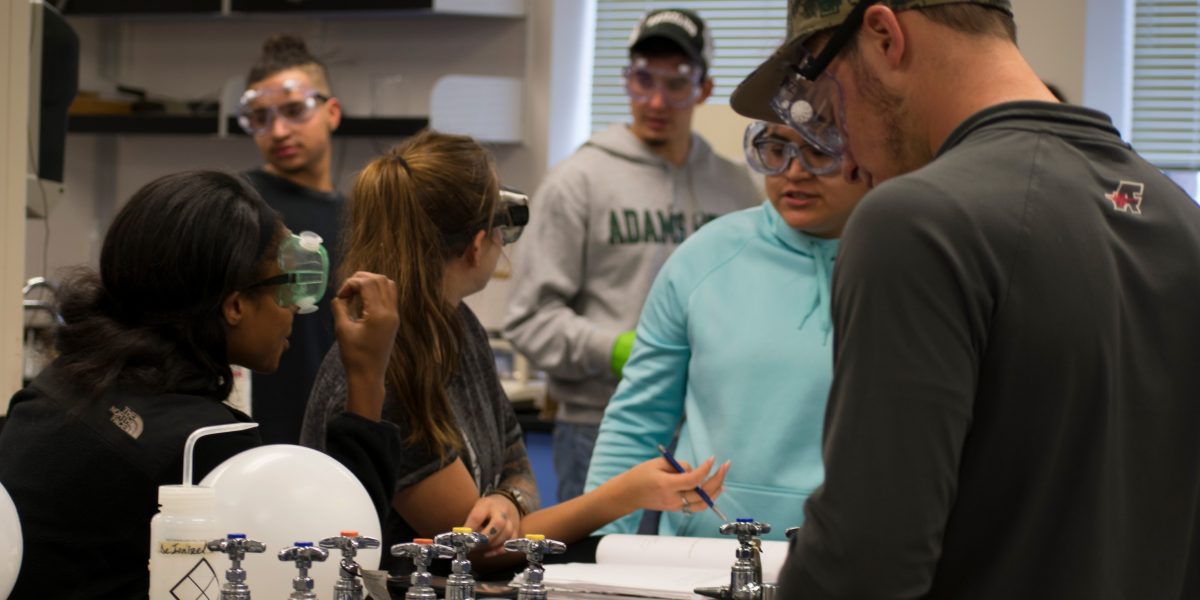Undergraduate Pre-Health Programs
Prepare for your future in the health sciences
The pre-health programs at Adams State University provide students the opportunity to prepare for their professional education in a personable and interactive small college environment while providing them a liberal arts education.
Adams State offers foundational courses that are required for admission to postgraduate professional programs in the health sciences (e.g., medicine, dentistry, pharmacy). In general, students can apply to professional programs having earned a degree in almost any discipline, so long as they have completed courses specifically required for admission.
Advising for Pre-Health Programs
It is highly recommended that students consult with an Adams State advisor early on for proper guidance and course scheduling:
Pre-Health AdvisingAdditional information about health-related careers can be found at the explorehealthcareers.org
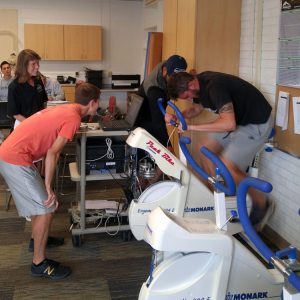 Pre-Physical Therapy
Pre-Physical Therapy
Professional physical therapy education programs in the United States are doctoral-level programs (Doctor of Physical Therapy or DPT). Most of these programs require that applicants have earned a bachelor’s degree prior to admission into the DPT program. In addition, most DPT programs require a minimum number of clinical experience hours with a physical therapist.
Pre-physical therapy students should select an undergraduate major that complements their interests and strengths, while at the same time providing the necessary prerequisite courses. Most students will major in a science field such as biology, exercise science, or chemistry that will include at least some of the common prerequisites (e.g., Anatomy, Physiology, General Chemistry, Physics, Biology, Psychology). Each DPT program will vary in their specific requirements and it is the student’s responsibility to know the requirements for the programs to which they intend to apply. The American Physical Therapy Association’s website is an excellent resource for pre-physical therapy students. In addition, it is essential that an advisor in the chosen major be consulted early in the student’s academic career for proper guidance and course selection.
High school students intending to pursue a career in physical therapy should prepare for an undergraduate degree that is heavily science-based and rigorous. Their preparation should include higher-level math and science courses.
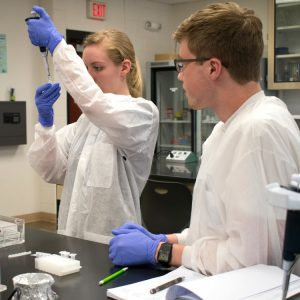 Pre-Medicine
Pre-Medicine
Professional medical education programs in the United States are doctoral-level programs that may focus on allopathic (Medical Doctor or MD), osteopathic (Doctor of Osteopathic Medicine or DO), or podiatric (Doctor of Podiatric Medicine or DPM) medicine. Most of these programs require that applicants have earned a bachelor’s degree prior to admission into the medical program. In addition, most medical programs expect candidates to have a notable amount of clinical shadowing hours with a physician. Extracurricular activities including community/volunteer service and conducting research are also encouraged to strengthen a candidate’s application.
Pre-Medical students should select an undergraduate major that complements their interests and strengths, while at the same time providing the necessary prerequisite courses. Most students will major in a science field such as biology or chemistry that will include at least some of the common prerequisites (e.g., Biology, Chemistry, Physics, Mathematics), though other majors are acceptable. Each professional medical program will vary in their specific requirements and it is the student’s responsibility to know the requirements for the programs to which they intend to apply. The Association of American Medical Colleges student web portal is an excellent resource for pre-medical students considering applying to a MD program. Likewise, the American Association of Colleges of Osteopathic Medicine and American Association of Colleges of Podiatric Medicine websites are outstanding resources for further exploring osteopathic and podiatric medicine respectively. Many undergraduates take the Medical College Admission Test (MCAT), which is part of the package for applicants applying to MD, DO, and DPM programs, during the summer between their third and fourth academic year. In addition, it is essential that an advisor in the chosen major or a pre-medical advisor be consulted early in the student’s academic career for proper guidance and course selection.
High school students intending to pursue a career in medicine should prepare for an undergraduate degree that is heavily science-based and rigorous. Their preparation should include higher-level math and science courses.
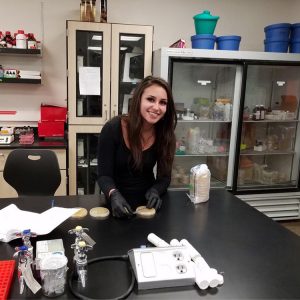 Pre-Dentistry
Pre-Dentistry
Professional dental education programs in the United States are doctoral-level programs. Professionals who care for teeth are known as a Doctor of Dental Surgery (DDS) or Doctor of Dental Medicine (DMD). Further specialization in Orthodontics or specific populations such as pediatrics can be achieved in addition to the DDS/DMD degree. Most of these programs require that applicants have earned a bachelor’s degree prior to admission into the professional dental program. In addition, most professional dental programs expect candidates to have a notable amount of clinical shadowing hours with a dentist. Extracurricular activities including community/volunteer service and conducting research are also encouraged to strengthen a candidates application.
Pre-Dental students should select an undergraduate major that complements their interests and strengths, while at the same time providing the necessary prerequisite courses. Most students will major in a science field such as biology or chemistry that will include at least some of the common prerequisites (e.g., Biology, Chemistry, Physics). Each professional dental program will vary in their specific requirements and it is the student’s responsibility to know the requirements for the programs to which they intend to apply. The American Dental Association Education/Careers and the American Dental Education Association’s student web portals are excellent resources for pre-dental students considering applying to a dental program or as a resource for further exploring dental careers. In addition, it is essential that a pre-dental adviser be consulted early in the student’s academic career for proper guidance and course selection.
High school students intending to pursue a career in dentistry should prepare for an undergraduate degree that is heavily science-based and rigorous. Their preparation should include higher-level (AP) math and science courses.
 Pre-Optometry
Pre-Optometry
To become a Doctor of Optometry (OD), students must first complete at least three years of undergraduate study at an accredited college or university. Most optometry students hold a baccalaureate or higher degree. While candidates are in college or at some point before planning to attend an OD program, the Optometry Admission Test (OAT) must be taken. Candidates must then apply to and be accepted at an accredited optometry school.
Each optometry program will vary in their specific requirements and it is the student’s responsibility to know the requirements for the programs to which they intend to apply. Pre-optometry students will major in a science field such as biology or chemistry and will follow the same course outline as pre-medical or pre-dental students. The Association of Schools and Colleges of Optometry’s webportal is an excellent resource for students considering applying to an optometry program.
High school students intending to pursue a career in dentistry should prepare for an undergraduate degree that is heavily science-based and rigorous. Their preparation should include higher-level (AP) math and science courses.
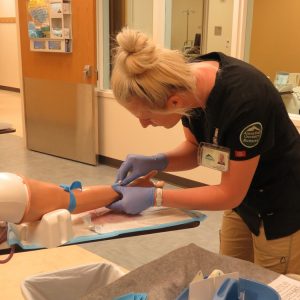 Pre-Nursing
Pre-Nursing
A Bachelor of Science Degree in Nursing (BSN-RN) is offered at Adams State. Please see the Nursing – Undergraduate Program for prerequisite requirements. The American Association of Colleges of Nursing’s webportal provides additional information regarding the nursing profession.
High school students intending to pursue a career in Nursing as a Bachelor’s prepared nurse should prepare for an undergraduate degree that is heavily science-based and rigorous. Their preparation should include higher-level (AP) math and science courses.
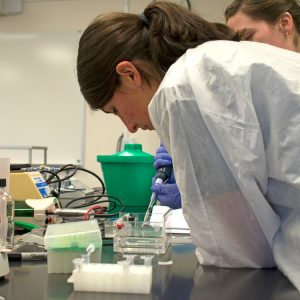 Pre-Pharmacy
Pre-Pharmacy
The Doctor of Pharmacy (PharmD) program is a four-year professional program that prepares individuals for a variety of careers within the pharmacy profession. A doctor of pharmacy degree is the only degree that prepares students to become a practicing licensed pharmacist in the U.S.
Pre-Pharmacy students should select an undergraduate major that complements their interests and strengths, while at the same time providing the necessary prerequisite courses. Most students will major in a science field such as chemistry or biology that will include at least some of the common prerequisites (e.g., Biology, Chemistry, Physics). Each professional pharmacy program will vary in their specific requirements and it is the student’s responsibility to know the requirements for the programs to which they intend to apply. However, common prerequisite courses include 2-semesters of General Biology, General Chemistry, Organic Chemistry, and Human Anatomy and Physiology. Also commonly required are 1-semester of Physics, Calculus, Microbiology, and Biochemistry. For more information about Pharmacy School Admission requirements, please visit the American Association of Colleges of Pharmacy (AACP) website.
High school students intending to pursue a career in pharmacy should prepare for an undergraduate degree that is heavily science-based and rigorous. Their preparation should include higher-level (AP) math and science courses.
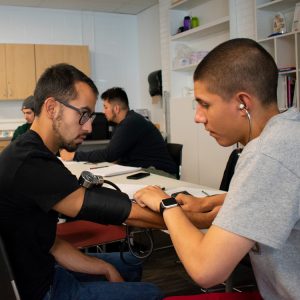 Pre-Physician Assistant
Pre-Physician Assistant
Physician Assistants (PAs) are medical professionals who diagnose illness, develop and manage treatment plans, prescribe medications, and often serve as a patient’s principal healthcare provider. PA program admission is highly competitive. An undergraduate education with an emphasis on sciences (e.g., biology or chemistry) is required. Applicants to PA programs typically have in excess of 1,000 hours of direct patient contact experience (e.g., as paramedics, athletic trainers, medical assistants, or nurses). Each physician assistant program will vary in their specific requirements and it is the student’s responsibility to know the requirements for the programs to which they intend to apply.
Graduation with a master’s degree from an ARC-PA accredited program is required prior to being eligible to take the Physician Assistant National Certifying Exam (PANCE) through the National Commission on Certification of Physician Assistants (NCCPA). The American Academy of Physician Assistants’(AAPA) webportal is an excellent resource for students considering applying to a PA program.
High school students interested in becoming a physician assistant should prepare for an undergraduate degree that is heavily science-based and rigorous. Their preparation should include higher-level (AP) math and science courses.
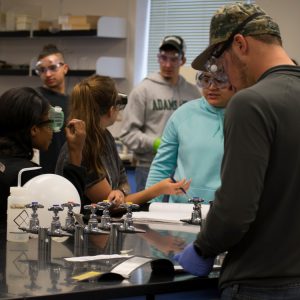 Pre-Veterinary Medicine
Pre-Veterinary Medicine
Veterinary medicine education programs in the United States are doctoral-level programs that typically require applicants to earn a bachelor’s degree prior to admission into the program. Veterinary medicine is one of the most competitive medical programs, and veterinary programs expect successful candidates to have good grades and a diversity of experience working with animals upon application. The Association of American Veterinary Medical Colleges webportal is an excellent resource for students considering applying to a veterinary program.
Pre-veterinary students should select an undergraduate major that complements their interests and strengths, while providing the necessary prerequisite courses. Most students will major in a science such as biology or chemistry that will include some of the common prerequisites (e.g., Biology, Chemistry, Physics). The Veterinary Medical College Application Service (VMCAS) is the central application point for many veterinary colleges, but potential applicants should know the specific requirements for the programs to which they intend to apply. It is important to contact the pre-veterinary advisor early in one’s undergraduate career for proper guidance and course selection.
High school students intending to pursue a career in veterinary medicine should prepare for a rigorous undergraduate degree that is based on mathematics and science courses.


